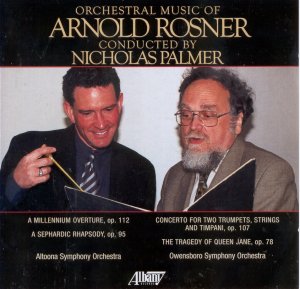I have previously sung the praises of the music of
Arnold Rosner. I am pleased to have the excuse to do that again in reviewing
a disc given over to Rosner's orchestral music. Encouragingly the disc
is marked 'Orchestral Music of Arnold Rosner - Volume I'.
Both the Sephardic Rhapsody and the Overture
spring from Rosner's long association with the conductor David Amos.
The Millenium Overture is an orchestration of the final
movement of Rosner's 1990 Cello Sonata No. 2. The brass are commandingly
to the fore in a work that is quick-witted, emotional and restless.
It has his trademark exotic flavour, a galumphing almost brutal rhythmic
punctuation mixed with Gabrielian work for the whole brass complement.
A Sephardic Rhapsody has that Mozarabic
curve and sway to the tunes heard instantly in extensive writing for
solo strings and trumpet. The lines and their treatment impart dignity
and reserve without being emotionally stilted. It is somewhat in the
same line as Hovhaness but much more is going on in Rosner's music.
The music also touches base with works such as Vaughan Williams' Flos
Campi and Rozsa's Tripartita.
After those two works we move to the Owensboro orchestra
for the three movement Concerto for Two Trumpets. Strings and Timpani.
This is virtuosic, free from jazziness, infused with dignified hieratic
eloquence and the drama of ritual. The antiphonal effects are superbly
captured in this recording. The concerto was written for Ted McIrvine
and Bruce McKinney (both composers and trumpeters). This recording is
dedicated to Ted's memory - he died of bone cancer in 2000.
Finally we come to the substantial four movement suite
The Tragedy of Queen Jane. This is a suite from the music
Rosner wrote for the opera The Chronicle of Nine, on a play by
Florence Stevenson. The suite opens with a grave soliloquy called Prelude.
This is very close in feel to Vaughan Williams' Tallis Fantasia leavened
with rising harp figures and fearsome brass passages in what we now
recognise as Rosner's distinctive super-Baroque style. Here however
the brass is edgy with panic or insurrection. The Masque has
an antique feeling which transforms a theme rather related to Vaughan
Williams' Greensleeves Fantasia with the sort of grandeur to
be found in Reger's Baroque experiments. In the opera this is the wedding
music. The Clarion movement is belligerent; indeed in the opera
it refers to the skirmish in which Queen Jane's forces are driven off.
The Dirge has one of those massive uprooting fanfares - touched
with catastrophe and restive with tragedy. In the opera this forms the
Act II prelude. Rosner says that we may think of it as a dirge for Jane.
Rosner's music packs a powerful emotional punch - and
it is instantly recognisable, with its glowering and gaunt brass and
calmly placid and elysian string writing. We need to hear more please.
Rob Barnett
